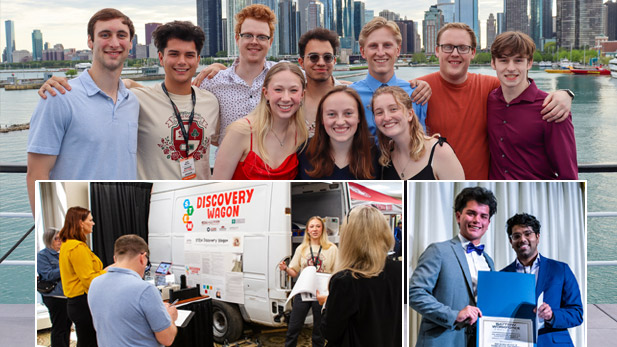Rose-Hulman Team Earns First-Year Honors in Elite Battery Workforce Challenge

Students’ innovative design of their electric vehicle battery pack was judged following the first year of the Battery Workforce Challenge, a collegiate engineering competition sponsored by the Department of Energy and Stellantis.
Rose-Hulman students have earned honors for its progress in developing innovative battery technology for an electric van during the first year of the Battery Workforce Challenge. The students, in partnership with students from Ivy Tech Community College, designed innovative aspects of the EV battery pack that’s a key element of the three-year collegiate engineering competition.
Overall, the team placed fifth out of the 12 North American university engineering teams, and received awards for the following:
- Best project initiation plan
- Best Subject Matter Expert (SME) deep dive
- Runner-up for mid-year project review presentation
Year One of the challenge focused on the design of the EV battery pack. The teams' focus spanned from the granular level of cell characterization and testing to the broader scope of pack-level design, encompassing thermal, mechanical, and electrical considerations, while upholding stringent safety standards, and design for recyclability.
Teams were judged on the design of their electric vehicle battery pack. The Rose-Hulman/Ivy Tech group received praise for their design of the EV modules and battery pack, as well as designing and building a cell characterization test stand from scratch, creating software algorithms to run the tests, and preparing automated analysis scripts to analyze the collected data.
Cell Characterization Team Leader Makenna Gill, a chemical engineering student, said, “Our goal was to run the cell through constant capacity and Hybrid Pulse Power Characterization (HPPC) tests at various current rates and temperatures to determine compliance calculations and performance for the cell which is used to help determine power calculations for the pack. We built our own cell tester from scratch, which is an impressive technical feat. We were the only team in the competition that successfully completed this and judges were impressed.”
The next year of the competition (year two of the three) is geared towards building and testing the battery pack. Students will make revisions and improvements to their year one design and begin assembling the battery into their vehicle. Teams will receive a Ram ProMaster electric van from Stellantis for the remainder of the competition that culminates in 2026.
The Rose-Hulman/Ivy Tech team presented a proposal to use its ProMaster EV as a mobile lab to promote science, technology, engineering, and mathematics (STEM) within the Wabash Valley.
“We hope to use our van as a way for kids in the community to explore all of the exciting STEM things we are passionate about,” said Team Communications Lead Ella Hart, a mechanical engineering student. “We also are going to strengthen our bond with Ivy Tech as we build and test our pack. This is something that everyone is excited about.”
The challenge is sponsored by the U.S. Department of Energy and Stellantis while being managed by the Argonne National Laboratory. Additional sponsors include American Battery Technology Company, BASF, Eaton, AVL, Dana Corporation, MathWorks, Analog Devices, Inc., and Gamma Technologies.